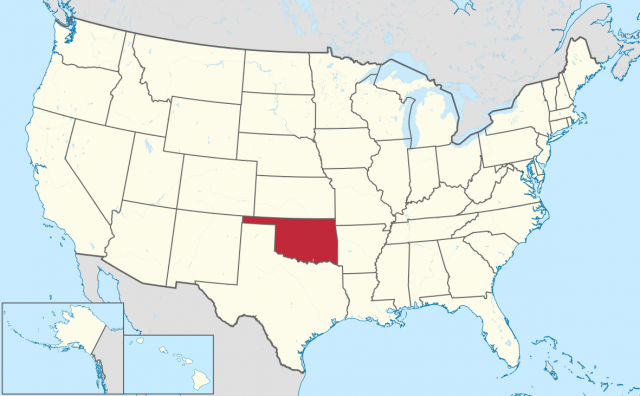The State of Oklahoma
AT A GLANCE
Name: Oklahoma comes from the Choctaw words okla humma, which mean “red people.”
Nickname: Sooner State
Capital: Oklahoma City
Size: 69,903 sq. mi. (181,048 sq km)
Population: 3,911,338 (2015 est)
Statehood: Oklahoma became the 46th state on November 16, 1907.
Electoral votes: 7 (2016)
U.S. representatives: 6 (until 2016)
State tree: redbud
State flower: mistletoe
State animal: American bison
Highest point: Black Mesa, 4,973 ft. (1,516 m)

THE PLACE
Oklahoma is a southwestern state located close to the center of the continental United States. It has a variable terrain, with hilly slopes in the Ozark Mountains in the northeast, fertile plains in the Red River Region, and sandstone ridges that form the Ouachita Mountains in the southeastern corner near Arkansas.
The middle region of Oklahoma has forested hills with rich deposits of oil and plains with fertile soil for farming. Southcentral Oklahoma is home to the Arbuckle Mountains. Over millions of years, these once-tall mountains have been so eroded by wind and weather that the peaks are low and rounded, with many unusual rock formations. To the southwest are the Wichita Mountains, which are higher peaks made of granite. Oklahoma's Panhandle, the part of the state that juts out to the west, is a region of level prairie.
Oklahoma's two major rivers are the Red and the Arkansas. The state's most important resources are its large areas of fertile soil and prairie grasses, and deposits of petroleum, natural gas, and coal. Most of Oklahoma has a warm climate, which is important for the state's largely agricultural economy. Northwestern Oklahoma is cooler and receives more snow in the winter. Oklahoma's Panhandle is the state's snowiest region.
Facts and Firsts
- Oklahoma has about twice as many artificially created lakes as it has natural lakes.
- Thirty-nine Native American tribes have headquarters in Oklahoma.
- The largest independently owned Native American newspaper in the United States is the Native American Times in Tulsa.
- Sylvan Goldman invented the shopping cart in Oklahoma.
- In 1935, the first automatic parking meter, invented by Carl C. Magee, was installed in Oklahoma City.
- Okmulgee hosts a pecan festival every June, and the town holds the world's record for the world's largest pecan pie—42 feet (13 m) in diameter.
THE PAST
Oklahoma's plains were once the home of huge herds of bison that provided food and supplies to many Native American peoples, including the Arapaho, Cheyenne, Comanche, Kiowa, Pawnee, and Wichita. In 1541, the first Europeans to reach the area were Spanish explorers in search of gold. Finding none, they quickly passed through. The French claimed the Oklahoma region in 1682.
Although the Spanish regained control in 1762, the French eventually retook Oklahoma and in 1803 sold it to the United States as part of the Louisiana Purchase.
Since few white settlers lived in the area, the U.S. government forced many Native American tribes to give up their lands in the East and relocate to Oklahoma. Between 1830 and 1842, many Native Americans became ill and died during the forced migrations. For the Cherokee, the westward route came to be known as the Trail of Tears.
Soon the territories that surrounded Oklahoma began to fill with settlers from the East, who sought good, inexpensive land to farm. Texas cattle ranchers pressured the U.S. government to open Oklahoma to settlement so that they could drive their cattle straight through from Texas to Kansas. The government resisted until 1889, when it bought more than 3 million acres of land (1.2 million ha) from Creek and Seminole tribes and opened the area to settlement. About 50,000 people moved into Oklahoma on the first day that the land was opened.
In the same year, Oklahoma's first oil well began operation near Chelsea. Two of the most famous eras in Oklahoma's history were dramatized in the musical play Oklahoma! and John Steinbeck's novel The Grapes of Wrath. The musical Oklahoma! depicts the years after Oklahoma was opened to settlement, when farmers and cattle ranchers competed for control of the land. The Grapes of Wrath portrays a more difficult time—the drought and economic hardship of the Dust Bowl during the Great Depression. During this time, thousands of farm families lost their money and land and left for California to look for work.
After the Great Depression, oil production increased in Oklahoma, and today there is even an oil well on the grounds of the State Capitol. (The well ended production in 1986 but remains as a tourist attraction.) Oklahoma became increasingly urban as factories were built, and dams were constructed to provide hydroelectric power to new industries. The Federal Aviation Administration (FAA) built an aeronautics center in Oklahoma City in the 1960s, which furthered Oklahoma's industrial economy.
In 1995, Oklahoma was the scene of tragedy when a terrorist bomb destroyed Oklahoma City's Murrah Federal Building and killed 168 people.
THE PRESENT
Because of its location midway between the East and West Coasts, Oklahoma is a major transportation and distribution center for manufactured goods.
Factories in Oklahoma produce computer and electronics equipment, machinery, automobiles, rubber and plastic products, and heating and refrigeration equipment.
Oklahoma has remained a largely agricultural state, with farms covering about three-quarters of its area. Many cattle ranches operate throughout the state. Oklahoma has more than 5 million beef cattle; other livestock include chickens, hogs, and turkeys. Oklahoma is a leading producer of wheat and hay.
Born in Oklahoma
- John Berryman, poet
- Garth Brooks, singer
- L. Gordon Cooper, astronaut
- Iron Eyes Cody, actor
- Ralph Ellison, author
- James Garner, actor
- Chester Gould, cartoonist
- Woody Guthrie, singer and composer
- Roy Harris, composer
- Ron Howard, actor and director
- Jean Kirkpatrick, U.S. public official
- Wilma Mankiller, chief of the Cherokee nation
- Mickey Mantle, baseball player
- Reba McEntire, singer
- Bill Moyers, journalist
- Will Rogers, humorist
- Maria Tallchief, ballerina
- Jim Thorpe, athlete
- Alfre Woodard, actress